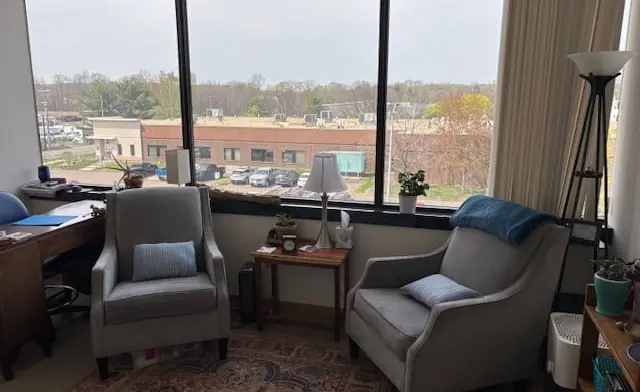About Pathfinder Recovery Vermont (Virtual)
Pathfinder Recovery is redefining what recovery can look like in Vermont.
We offer fully virtual, in-home treatment for adults facing mental health and substance use challenges, designed for those who need flexibility without sacrificing quality. Our services include ambulatory detox, therapy, peer support, and medication for addiction treatment (MAT), with the specialized backing for neurodivergent individuals and those living with co-occurring conditions.
Whether you’re in a rural community or simply seeking more privacy and control in your care, Pathfinder makes treatment accessible, inclusive, and truly individualized. We believe healing happens when people feel understood and supported, not judged.
With a compassionate team based in Vermont, we’re here to meet you where you are and help you move toward what’s possible.
Breaking Boundaries. Building Futures.
Your Home is Our Foundation. Your Future is Our Mission.
Rehab Score
Gallery










Accepted Insurance
Other Forms of Payment
Self-pay involves paying for treatment out of your own pocket. You can use savings or credit, get a personal loan, or receive help from family and friends to fund your treatment. If you don't have insurance or your insurance plan doesn't cover a specific program, self-pay can help ensure you still get the care you need.
Private insurance refers to any kind of healthcare coverage that isn't from the state or federal government. This includes individual and family plans offered by an employer or purchased from the Insurance Marketplace. Every plan will have different requirements and out of pocket costs so be sure to get the full details before you start treatment.
Medicare is a federal program that provides health insurance for those 65 and older. It also serves people under 65 with chronic and disabling health challenges. To use Medicare for addiction treatment you need to find a program that accepts Medicare and is in network with your plan. Out of pocket costs and preauthorization requirements vary, so always check with your provider.
Addiction Treatments
Levels of Care
Medical detox is the process of weaning your body off addictive drugs like alcohol, benzodiazepines, or opioids, under the 24/7 care of medical professionals. Often the first step in the recovery process, medically assisted detox takes place in an inpatient setting, where you will be closely monitored to ensure your maximum health and safety. Medications, like Suboxone or Vivitrol, may be administered if needed to alleviate any potential withdrawal symptoms.
Intensive outpatient programs (IOP) provide high-level support for clients who do not need inpatient treatment or who prefer to live at home while in early recovery. Intensive outpatient rehabs also offer support for clients who are reintegrating into their community following inpatient care. Clients typically receive a minimum of nine hours of treatment per week, though many programs offer up to 20 therapeutic hours. Psychotherapy, recovery education, holistic therapies, and medication assisted treatment (MAT) are standard.
Clients may choose to enroll in outpatient treatment to facilitate their transition out of intensive inpatient care. Working professionals and family caregivers may also prefer to remain in their home and community post-detox, making outpatient treatment an ideal option. Many facilities offer a full continuum of care, including partial hospitalization (PHP), intensive outpatient (IOP), sober living, and standard outpatient programming. Psychotherapy, recovery education, evidence-based complementary therapies, and medication assisted treatment (MAT) are widely available in outpatient programs.
If in-person visits are a challenge for you, telehealth in Vermont may provide a good option. This allows you to receive treatment from home or any other location. You can meet with a counselor, receive a prescription, or send updates on your condition, all through your smartphone or other device.
Rehab aftercare programs approach recovery as a life-long process that requires robust, individualized, and ongoing care. Clients in drug rehab aftercare have typically completed detox and intensive inpatient treatment and are weeks or months into their recovery journey. These programs are designed to promote clients' continued sobriety through a comprehensive portfolio of services aligned with the clients' evolving needs. Peer coaching, career counseling, and relapse prevention services are standard in these continuing care programs.
Treatments
Alcoholism is a condition that's characterized by physical dependence on alcohol and an inability to stop drinking. It can be extremely difficult to overcome an alcohol addiction without professional treatment. Alcohol rehab in Vermont offers the necessary tools and support to help you move forward in recovery. This process typically involves three phases of treatment: detox, rehab, and maintenance.
A person with substance dependence can achieve recovery through drug rehab in Vermont. Professional staff provide a combination of interventions that are designed to help you attain and maintain abstinence from drugs.
There are a range of substance abuse treatment options in Vermont consisting of inpatient residential, outpatient, intensive outpatient, and partial hospitalization drug and alcohol rehabs. In these programs, you can typically expect to receive a comprehensive assessment, individualized treatment plan, individual and group therapy, skills training, family counseling, and educational groups. This integrated approach helps to overcome unhelpful coping strategies, increases your ability to manage stress, and supports you to prioritize your recovery.
Vermont's specialized dual-diagnosis addiction treatment programs provide comprehensive care for individuals with co-occurring substance use disorders and mental health conditions. These programs offer evidence-based therapies, holistic approaches, experiential therapies, trauma-informed care, recovery support groups, and family counseling, to address both disorders and promote mental health. Many dual diagnosis rehabs offer alumni programs to help you sustain recovery after treatment.
In a dual diagnosis treatment setting, you are able to receive care for both an addiction and a mental health disorder simultaneously. Each personalized dual diagnosis treatment plan includes a number of different mental health therapies and services, like cognitive-behavioral therapy (CBT), experiential therapies (equine and animal therapy, outdoor therapy groups, and individual or group counseling sessions. Relapse prevention education and emotional coping skills training are also commonly offered.
Programs
Adult rehab programs include therapies tailored to each client's specific needs, goals, and recovery progress. They are tailored to the specific challenges adult clients may face, including family and work pressures and commitments. From inpatient and residential treatment to various levels of outpatient services, there are many options available. Some facilities also help adults work through co-occurring conditions, like anxiety, that can accompany addiction.
Men face specific challenges and concerns when seeking addiction treatment. Gender-specific recovery programs help them tackle these issues head-on in an environment that's focused, targeted, and distraction-free. It also gives them the opportunity to connect with and learn from other men who have been through a similar journey and can offer support for the next step.
Rehabs for women provide a safe, nurturing space for female clients to heal. These treatment programs consider the specific obstacles that women can face during recovery and place a special emphasis on mental, social, physical, and reproductive health. They explore how each woman's experience has shaped the trajectory of their substance use, addressing issues such as sexual abuse and past trauma.
Recovery is most successful when clients feel accepted and validated by their peers and treatment providers. Facilities that offer LGBTQ-inclusive programming are committed to creating a safe space where everyone can grow and recover without fear of judgment or discrimination. They will have dedicated policies in place to create a safe and supportive environment that fosters free expression.
Clinical Services
During cognitive behavioral therapy in Vermont, you may set SMART goals, engage in guided discovery, journal, and participate in cognitive restructuring. These activities help change patterns of thinking and behavior to address substance use and mental health disorders effectively.
For individuals who want to build skills related to emotional regulation and mindfulness, dialectical behavior therapy can be a good fit. This evidence based therapy helps you accept your emotions while also learning skills to manage them and create healthier patterns of behavior. Treatment occurs in group and individual formats.
Trained therapists typically facilitate group therapy sessions. These sessions help support drug and alcohol addiction treatment using evidence based techniques such as Cognitive Behavioral Therapy and Motivational Interviewing. You begin to understand the link between your thoughts and behaviors, which helps to break the chains of addictive behavior.
Using a personalized approach for drug addiction treatment allows your therapist to tailor interventions in your individual therapy sessions to your unique circumstances. During your one on one sessions, you explore the underlying causes of addiction and develop effective strategies to manage cravings, improve mental health, and ultimately achieve long term recovery.
During trauma therapy, you work through the traumatic memories of an event you witnessed or experienced in a safe and supportive place. Your therapist will provide you with the tools needed to process the trauma, which in turn reduces your symptoms and improves your overall mental health.
Staff & Accreditations
Staff

Dr. David Hendricks, MD, FASAM
Chief Medical Officer

Dr. Hannah Jurewicz, PsyD
Chief Clinical Officer

Eliza Foltz
Chief Marketing Officer

Michael Brunk
Chief Executive Officer
Accreditations

The Joint Commission, formerly known as JCAHO, is a nonprofit organization that accredits rehab organizations and programs. Founded in 1951, the Joint Commision's mission is to improve the quality of patient care and demonstrating the quality of patient care.
Joint Commission Accreditation: Yes

